TRANSPORTED TO VAN DIEMENS LAND
ANOTHER RASTRICK MURDER
THE TRAGIC DEATH OF ELIJAH HOLROYD
During the early hours of the morning of the 27th December 1843, a 37 year old Rastrick man by the name of Elijah Holroyd was stabbed to death at a house in Toothill Bank following an argument. Elijah Holroyd was born on the 3rd March 1806 and was baptised at St. Matthew’s Church on the 11th May that same year. His father, John Holroyd was a jenny spinner (yarn spinner on a frame known as a spinning jenny) and Elijah grew up to become a hand-loom weaver
On the 22nd June 1830, he married Sarah Crossland at St. Mary’s Church, Elland and the couple had a son, John Edward, who was born the year prior to their marriage. The marriage ended in tragedy as Sarah died on the 19th July 1833 and was buried two days later at St. Matthew’s, Rastrick.

At the time of the 1841 census, Elijah was living with his son at Toothill Bank, close to his friend, Joseph Noble.
During the evening of Christmas Day 1843, a group of Rastrick men from the Toothill Bank area of Rastrick attended at the Thornhill Arms public house at the Top o’ Town, to celebrate the festive season. Both Joseph Noble and Elijah Holroyd were part of the group but at midnight, and after several drinks, Noble, a 36 year old labourer, decided to make his way home with a friend called Singleton who was staying over at his house for the night.
At around two o’clock in the morning, Singleton had gone to bed whilst Noble sat by the fireside smoking his pipe when some of the other friends who had been drinking with them earlier, turned up at his home (these were days when most people didn’t need to lock their doors). Elijah Holroyd was one of those who turned up at Joseph Noble’s house. In their drunken state, the visitors pulled the bed clothes off Singleton’s bed whilst he slept and then upturned it. The visitors thought this to be funny but Noble was not laughing. The Halifax Courier reported the story as follows:-
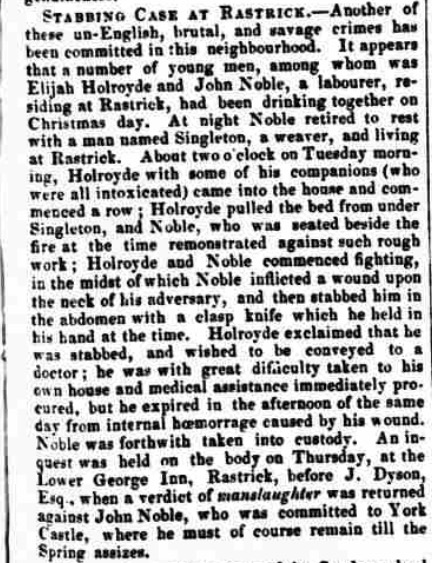
Joseph Noble stabbed Elizah Holroyd in the abdomen and he died from his wounds later that day. Following the tragic incident, the Inquest returned a verdict of manslaughter against Noble. Had the jury found him guilty of wilful murder, the only sentence in law at that time was execution by hanging.
The Assizes only sat four times per year and the winter sitting had taken place a couple of weeks before therefore Noble was detained at York Castle for over two months, before his trial at the York Assizes on the 9th March 1844. The Assizes took place in the impressive building we now know as the York Castle Museum.
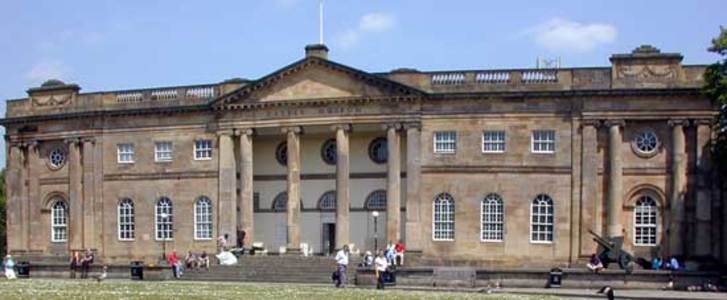
The Bradford Observer reported the trial of Joseph Noble in the following way:-
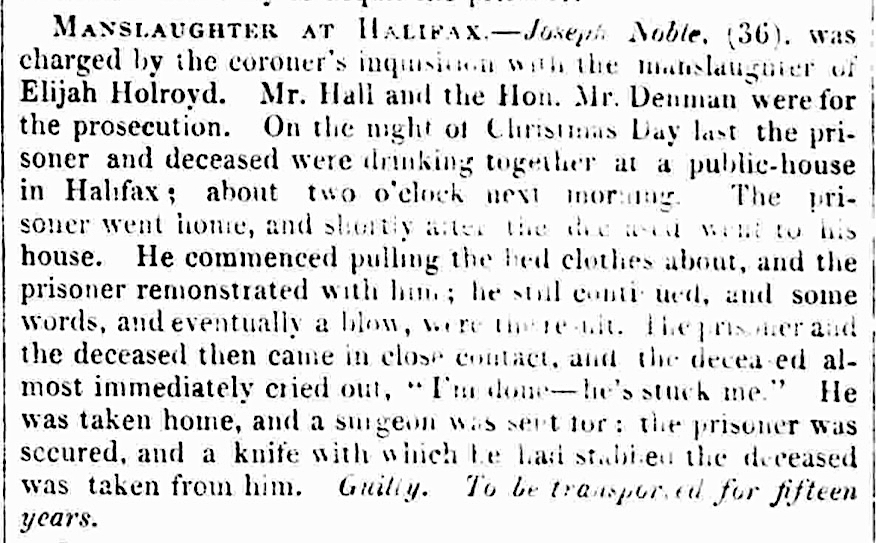
Joseph Noble (36) was charged by the coroner’s inquisition with the manslaughter of Elijah Holroyd. Mr. Hall and the Hon. Mr. Denman were for the prosecution. On the night of Christmas Day last the prisoner and deceased were drinking together at a public house in Halifax; about two o’clock next morning. The prisoner went home and shortly after, the deceased went to his house. He commenced pulling the bed clothes about and the prisoner remonstrated with him, he still continued, and some words, and eventually a blow were there hit. The prisoner and the deceased then came in close contact and the deceased almost immediately cried out, “I’m done – he’s stuck me.” He was taken home and a surgeon was sent for; the prisoner was secured and a knife with which he had stabbed the deceased was taken from him. Guilty. To be transported for fifteen years.
The York Herald added a few more details by saying that the parties in this case had been drinking together at the Thornhill Arms public house, Rastrick and at about 12 o’clock at night Noble went home accompanied by another young man who had received permission to sleep at his house. The prisoners companion went to bed, and he remained sitting over the fireside. About two hours afterwards, the deceased and several other persons called at Noble’s house and upon obtaining admission, deceased went up to the prisoner’s bed, pulled the clothes about and otherwise caused a disturbance in the place. The prisoner expostulated with Holroyd upon his conduct and ultimately a quarrel ensued and in scuffling together, the deceased was stabbed at the neck and also in the body, the effects of which latter wound he died.
So what happened to Joseph Noble following his conviction? He was taken to London to await transportation to the Australian colony and may have originally been taken to one of the hulk vessels. These were floating prison ships, moored in places such as Woolwich on the River Thames. The ships were usually de-commissioned naval boats and conditions on board were horrendous with contagious diseases rife. Prisoners were kept in irons to stop them trying to swim for freedom and they would often be incarcerated until such time that a transport ship became available to take them to Australia. Despite Millbank Prison (1816) and Pentonville (1842) being built, at the time when Joseph Noble was awaiting transportation, 70% of prisoners in a similar position to him were still imprisoned in the hulks until the Hulks Act was repealed in 1857. However, the Morning Post newspaper, dated the 29th June 1844 reported that the prisoners who were about to board the Lord Auckland convict ship will be from the Millbank Penetentiary therefore we know that Noble must have spent some of his time there.

Records show that the Lord Auckland departed from London on the 16th July 1844 (another record gives the date as the 13th). Joseph Noble and two hundred and thirty-seven other convicts set sail for Van Diemen’s land (Tasmania, Australia) and in addition to the convicts there was a guard of the 58th Regiment consisting of two officers and fifty rank and file soldiers. During the voyage, one hundred and one medical cases were treated of whom nineteen were soldiers of the guard, the remainder being prisoners. Two cases proved fatal. The ship arrived in Hobart, Tasmania on the 15th November that same year, a voyage of 122 days.
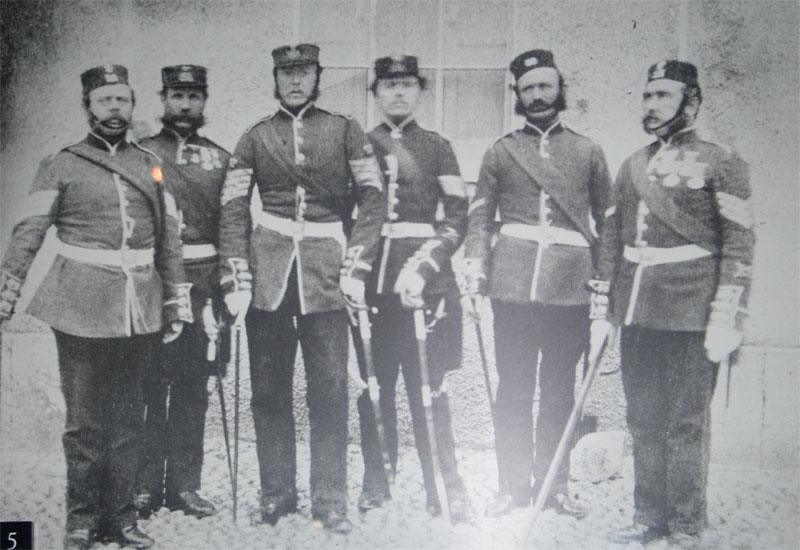
As an aside, after dropping off the convicts in Tasmania, the Lord Auckland sailed to Sydney where in December 1844, the soldiers from the 58th Regiment served at Parramatta in the colony of New South Wales. They were stationed there for three months before sailing down to New Zealand in March 1845 where their unit saw active service in the Bay of Islands. The Bay of Islands town of Russell, formerly Kororareka, was the original capital of the country until it was later established in Auckland (1841- 1865) and finally in Wellington (from 1865). There was a Maori uprising against British rule resulting in the Battle of Kororareka in 1845. I have visited Russell on a number of occasions and seen the musket ball holes from that battle which are still evident in the wooden church building. It is a lovely place and well worth a visit if you ever venture to that wonderful country. The 58th remained in New Zealand until 1847 but some of the soldiers actually stayed there until their retirement and made New Zealand their permanent home.
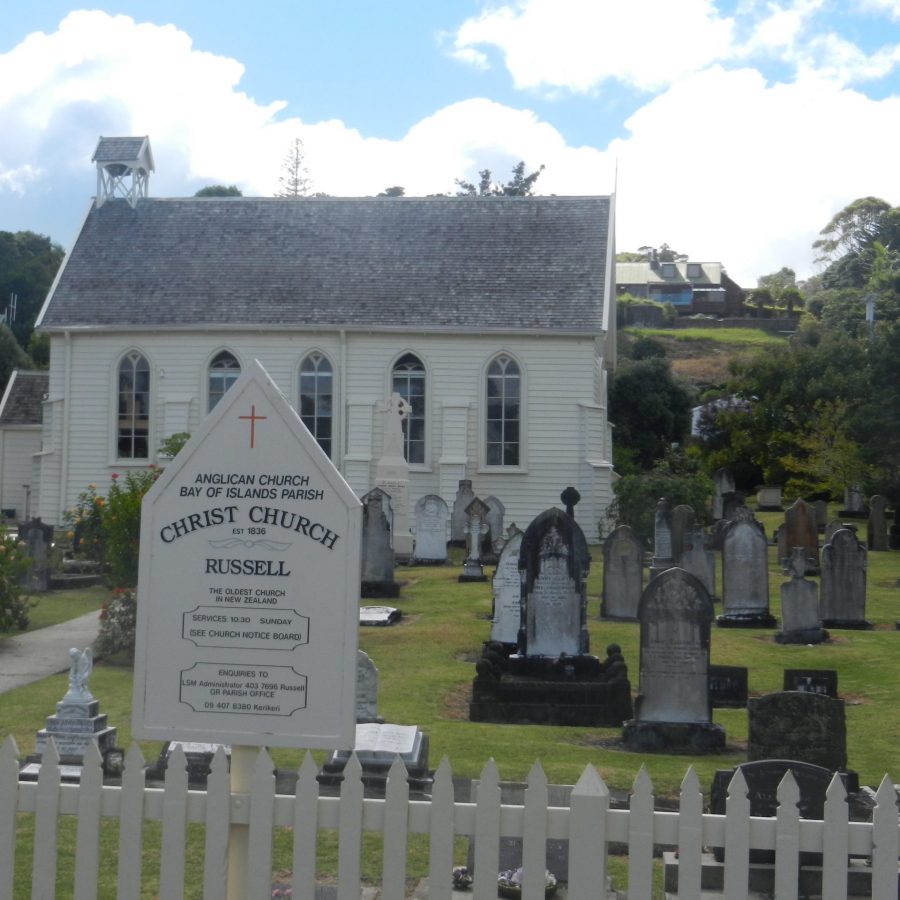

Back to the story …..
An experimental Probation System which was unique to Van Diemen’s Land was introduced in 1839. Despite various modifications, transportation to the colonies was discarded as a penalty for certain crimes in 1853. The idea behind the system was to reform the convict by adopting a regime of hard labour, education and religious instruction. All prisoners were classified, dependant upon the gravity of their crimes. This was supposed to negate any influence that the more hardened criminals would have over the lesser offenders. There were different stages of punishment, starting with a period of incarceration followed by gang labour which involved working with other prisoners at a Probation Station. Upon arrival, Joseph Noble was assigned to a labour gang for 21 months at Impression Bay in southern Tasmania. This would have involved building roads, working on farms and other such arduous jobs.
Once the convict had completed their initial work to a satisfactory standard, they progressed through stages of decreasing difficulty, eventually obtaining a pass which allowed them to work for settlers in the area. If there wasn’t any work with private employers, the passholders had to continue working at the Probation Stations on public works projects. Continued good conduct meant that a convict could be eventually considered for a Ticket of Leave, which allowed them to earn their own wages whilst working for another employer.
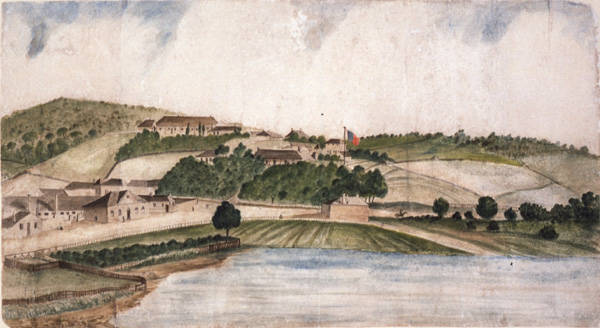
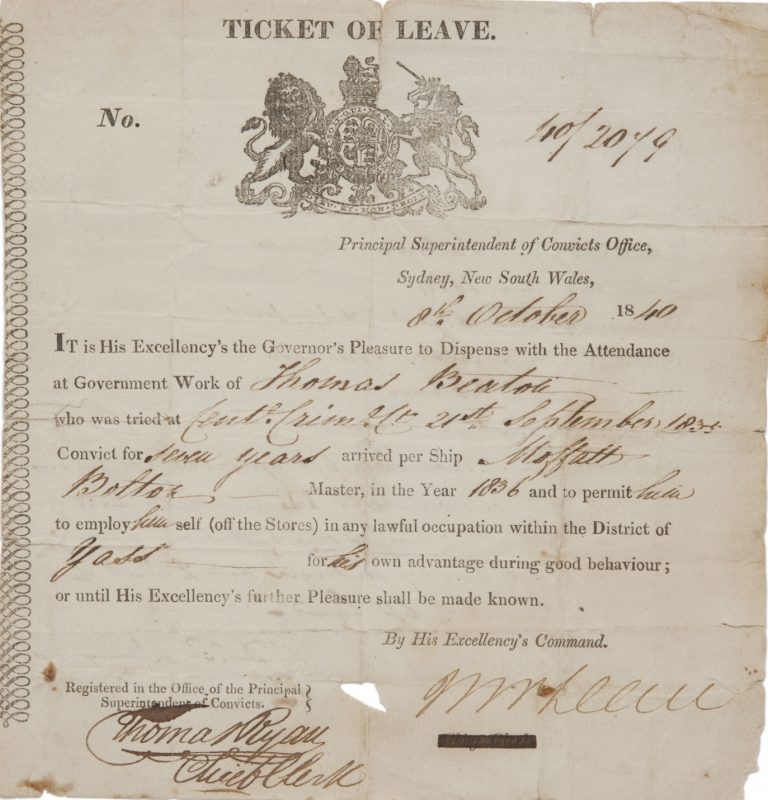
A Ticket of Leave was given as a reward for good behaviour and it allowed the holder to seek employment within a specified district but he was still subject to regulations such as the Hired Servants Act or the Master & Servants Act. The ticket holder was not permitted to leave the district without permission. Ticket-of-leave holders were also allowed to get married or bring their families from the UK and they could also purchase property, however, they were not permitted to carry firearms or board a ship. Convicts who kept to the conditions of the Ticket of Leave until the completion of one half of their sentence were then entitled to a Conditional Pardon, which removed all restrictions except a ban on leaving the colony. Convicts who did not observe the conditions of their ticket could be arrested. The Ticket of Leave had to be renewed annually and the recipients had to report to the local police station at regular intervals, attend a muster at given periods and attend local church services.
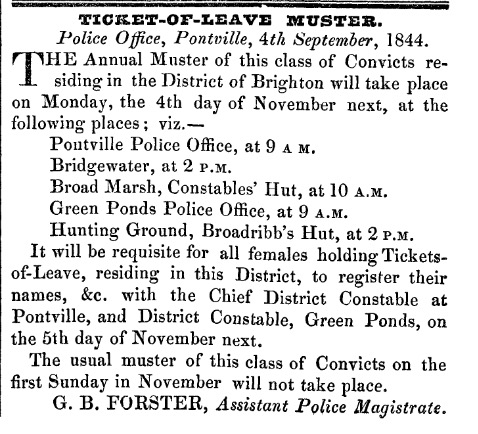
Once the original full sentence had been served, a Certificate of Freedom could be applied for by convicts serving a 7, 10 or 14 year sentence. As Joseph Noble received 15 years for his crime, he would never be able to obtain a Certificate of Freedom or become a totally free man ever again.
On Joseph Noble’s prisoner record it gave his gave his prisoner number as 14586. It states that he was transported for the manslaughter of Elijah Allwright (Holroyd), this being his first offence, by stabbing him in the belly with a knife. It goes on to say that Noble was single, in good health and was a quarry or farm labourer who could read a little. It gave a detailed description of him which would be used as identification in days prior to fingerprinting and DNA.
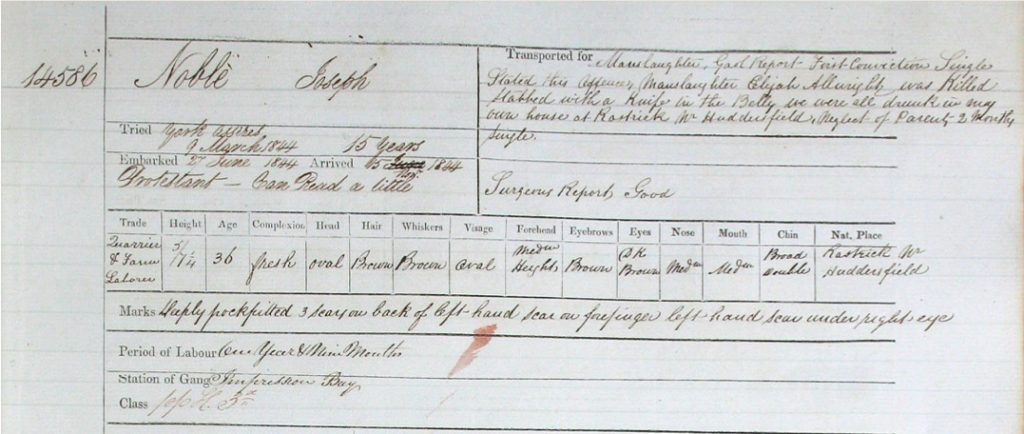
Joseph must have worked hard with the labour gang at Impression Bay as there is nothing untoward on his personal record. It shows that he emerged from the gang on the 15th August 1846, exactly one year and nine months after his arrival. He appears to have worked for several different settlers in the following year but it didn’t take him long to fall into bad habits. On the 3rd April 1847 he was found guilty of idleness and neglect of duty and was sentenced to one month imprisonment with hard labour. Joseph Noble kept out of trouble for almost two years but on the 12th March 1849, he was found guilty of being drunk and fighting in the township and in October of the same year, was again charged with neglect of duty. On the 19th March 1850 he was sentenced to six months in prison with hard labour for insolence and neglect of duty but this didn’t seem to have any effect because on the 12th of April, whilst serving this sentence, he was charged with misconduct in absenting himself for work on a frivolous plea of sickness for which his six months sentence was extended for another month. On the 12th July he was again absent from work on a frivolous plea of sickness for which he was reprimanded. Noble received a further one month imprisonment with hard labour for the offence of idleness and neglect of duty. It would seem that Noble was kicking against the system and becoming a persistent offender and this was certainly not the kind of behaviour that would earn him a valuable Ticket of Leave.
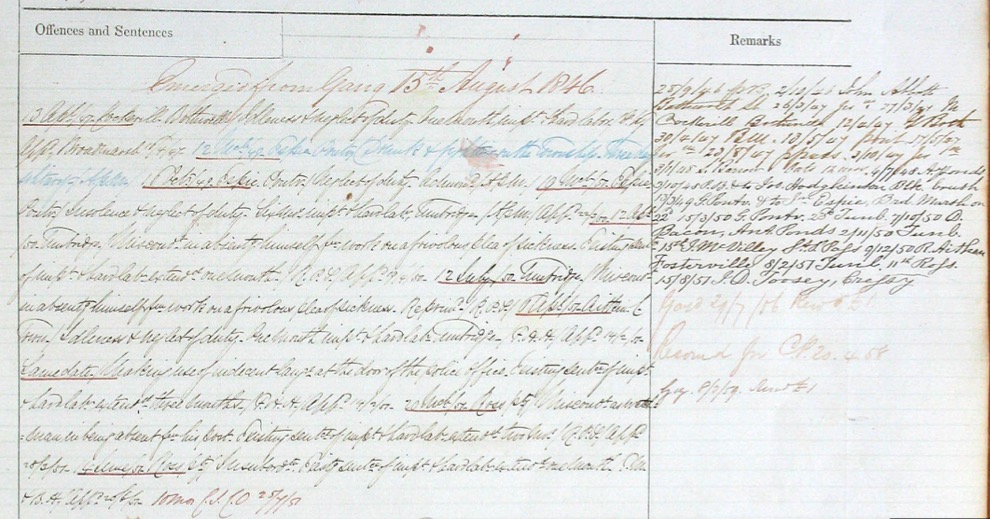
Just a few months later, on the 14th February 1851, he was sentenced to a term of a further three months imprisonment with hard labour for making use of indecent language at the door of the police office and on the 20th March 1851 he was found guilty of misconduct as a watchman, in absenting from his post, receiving a further extension to his term of imprisonment with hard labour of two more weeks. The following week, the 28th March 1851, Noble was found guilty of insubordination and his existing sentence of imprisonment and hard labour was extended for yet another one month. By my reckoning, Joseph Noble had spent over 13 months in prison, with hard labour but following his release he finally settled down registered just one further offence of being drunk, for which he received a reprimand on the 18th May 1853.
This good behaviour over a two year period meant that Joseph Noble was awarded with a Ticket of Leave on the 19th July 1853. This allowed him to seek employment with independent employers and earn his own wages. He moved to Longford near to Launceston, a good three hour car journey from Impression Bay in todays modern times but it only took two months before Joseph was sent to a House of Correction and ordered to forfeit twenty shillings wages for a breach of the Hired Servants Act. On the 20th September 1854, he was guilty of being drunk & disturbing the peace for which he was fined ten shillings. He was fined another five shillings for the same offence on the 2nd November 1854 and on the 2ndJuly 1855, he was fined £2 for being drunk along with a further £1 for assaulting a constable.
More offences followed:
4th August 1855 – Breach of Master & Servant Act, one month hard labour in the House of Correction for males
17th September 1855 – Drunk and assault, fined £3
18th January 1856 – misconduct, two months hard labour
17th July 1856 – absconding, term of transportation extended by eighteen months and three months probation.
Not surprisingly, his continued poor behaviour led to his Ticket of Leave being revoked on the 26th August 1856. In the following August of 1857, whilst still residing at Longford, Noble went absent again for three days but despite this, he was still rewarded with another Ticket of Leave on the 6th October 1857 however, failing to attend muster on the 5th October 1858 led to his Ticket of Leave being withdrawn once again. Joseph Noble was coming up to the end of his original 15 year sentence and with reasonable behaviour he would have been looking at a Conditional Pardon which although not being allowed to leave the colony, meant he would have been free of all restrictions. Instead, on the 18th January 1859, he found himself being charged with being absent from his authorised place of residence and receiving yet another three months hard labour. He was over 50 years of age by this stage and the hard labour punishments must have been taking their toll. On the 8th March 1859, he had served exactly 15 years, his trial date in the UK being the 9th March 1844. Joseph Noble must have been aware of this fact and once again decided that he would abscond. He was never seen again. We have no idea of the fate he encountered. Did he live out the rest of his days on the run or did he just give up the ghost and throw himself into a river to end his misery.
And so I end the story. One foolish deed following a night on the beer with a few mates in Rastrick led to a truly miserable existence for the rest of this man’s life at the other side of the world, never to see his family or friends again. How he must have lamented his action that Christmas night, during periods of reflectiveness.
R.I.P. Joseph Noble, wherever your final resting place may be and thanks for your story.
One question has been asked since I first published this story and that was, what happened to John Edward Holroyd, the son of the murdered Elijah Holroyd? I have already mentioned that Elijah’s wife had died in 1833 and at the time of his father’s death in 1843, John Edward was 14 years old.
His only direct relative was his father’s brother, Phineas Holroyd. He was born in 1810 and emigrated to the USA the year before the unfortunate stabbing incident of his brother. Upon hearing the news, he sent for John Edward to join him in Wisconsin, USA, which he did. John Edward never married and soon after the gold rush started in the hills of South Dakota in 1874, he went to join the many prospectors who were seeking their fortunes. As larger mining companies formed, John Edward went to work for the Deadwood Terra Mining Company at Lead and it was at this mine that he died in an explosion on the 16th November 1884. He was buried two days later and his effects were left to his only heir, Mrs Grace Bottomley, the wife of George Bottomley and daughter of Phineas Holroyd, who resided at Mineral Point, Wisconsin, USA.